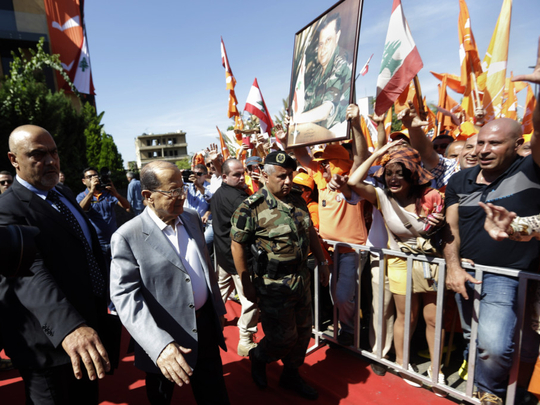
Washington, DC: Free Patriotic Movement leader, General Michel Aoun, rallied the party faithful on Sunday in his putative “million-men-march” and pledged to continue the FPM’s calling to combat corruption in Lebanon. He blamed the political class for the country’s woes, unwilling to concede that the FPM was part of the problem, as he pretended to represent the majority. “Those manipulating the parliamentary elections and hindering other national obligations will pay the price of their actions,” he declared at a rally near the presidential palace in Baabda, oblivious to the fact that the Lebanese constitution called for the election of the head-od-state by parliament.
Aoun’s populism, which drew less than 20,000 individuals, was unfortunate as it commemorated the events of October 13, 1990, which saw him abandon the Baabda Palace and, more important, his troops who were wiped out under Syrian bombardment. In a moment of hubris, the General turned the tables and affirmed that what ailed Lebanon was its governing elites, “the same officials who were ruling” then.
It did not occur to him nor his supporters that he was in power in 1990 and though he anticipated “a new phase of the struggle,” what was challenging was his insistence that the change that he predicted—which would presumably put power in the hands of people through popular elections—required either a revolution or a new national covenant.
Of course, this was not the first time that the FPM leader anticipated such a change, though he seldom asked himself how such change could possibly occur without a broad consensus that was, for all practical purposes, absent from the political and religious scenes in 2015.
Still, cheering crowd who believed in his “promised miracle” were actually giddy that their “voices would restore Lebanon’s glory,” which allegedly “came from God and [that] no one could possibly stop.”
In a particularly vexing passage in his speech, Aoun compared himself to Jesus Christ, when he declared that many wished to “crucify him” in 1990 that would have been accurate had he not fled the presidential palace. At times, Aoun sounded like a preacher instead of a politician, though, once again, his demand for the adoption of an electoral law based on proportionality, catered to the masses.
In fact, by working the street and tantalising backers with nearly impossible goals, Aoun ensured that the presidential vacuum would continue sine die. “We do not want a consensual president who will divide Lebanon to appease greedy officials,” chanted the General, adding: “We also do not want the election of a neutral head of state,” presumably because in FPM parlance such a president would be nothing more than a puppet.
Naturally, his logic implied that he would not be such a pawn, where he to accede to the post he craved.
Lebanon has been without a president since May 24, 2014 when Michel Suleiman ended his term without the election of a successor. Lack of consensus and, equally important, sharp political differences between rival March 8 and 14 alliances essentially meant that no president could now be elected.
Even if Aoun lambasted the cabinet under Prime Minister Tammam Salam, who ostensibly “should have resigned long ago” according to the FPM leader, he played coy with the truth since he was part of the government and championed paralysis over any number of concerns. Lebanon faced a series of problems, led by constant power outages—which was the privy of the FPM, and the ongoing garbage disposal crisis. He complained about lack of power and a crumbling infrastructure, but took no responsibility as any self-respecting politicians would have done.
What was even more bizarre was the desire to commemorate the October 13, 1990 catastrophe, which highlighted one of his darkest military and political chapters. As a direct consequence of the 1975-1990 Civil War, Aoun, who served as Commander of the Lebanese Armed Forces and was appointed Prime Minister by outgoing President Amine Gemayel in 1988 in what turned out to be a rival government, declared “Liberation War” against Syria. Between March 14, 1989 and October 13, 1990, occupying Syrian forces pummeled a variety of targets, killing hundreds of unarmed soldiers and civilians.
Although impossible to know since so many Lebanese soldiers were still missing, an estimated 700 civilians were killed in October 1990, while at least 400 to 500 Lebanese soldiers perished, including at least 200 loyal Aoun troops who simply disappeared.
Aoun, who allied himself in 1989-1990 with the Iraqi strongman Saddam Hussain, fell victim to the Baghdad-Damascus rivalries as well, something that no one around him mentions today. What are no longer disputable was his escape from the Presidential Palace to the French Embassy where he sought and received refuge before being allowed to travel to France where he remained in exile until May 7, 2005, eleven days after the withdrawal of Syrian troops from Lebanon. The Cedar Revolution, a direct result of the February 14, 2005 assassination of Prime Minister Rafiq Hariri, was not Aoun’s doing, though he pretended it was. Ironically, Aoun visited Syria in December 2008 when he declared that he believed President Bashar Al Assad who apparently gave him his word that there were no longer any Lebanese in Syrian Jails.












